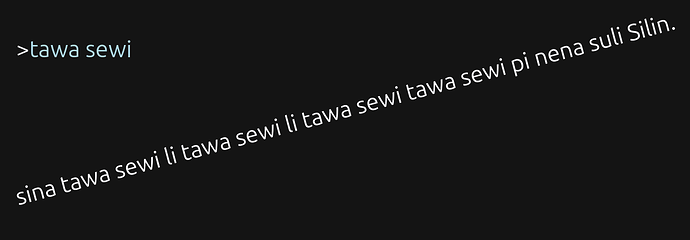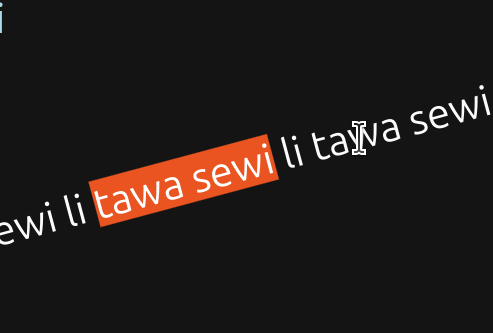While I know I have another Let’s Play already in progress, a game just came out in the Spring Thing that I’m especially excited about. Anpa ma is a game entirely in toki pona, a constructed language that challenges people to express their sentiments using only 100-some words and very basic grammar. And I’d like to play this while it’s still topical (i.e. while Spring Thing is still open)! My toki pona skills are not great—I haven’t done anything with it in years—but I was proficient in it once upon a time, and this seems like a great way to get back into it.
So let’s take a look at anpa ma, and see how well my rusty skills can do! If you want to follow along, it only takes a week to learn toki pona through the link I posted (though I wouldn’t recommend doing it in less than that), and what better reason is there than a new IF game?
To start with, anpa means “lower” or “below”, and ma means “place”. So I’m going to tentatively translate anpa ma as Underworld. We’ll see how correct that is…
sina sona ala e musi la sina ken kama sona kepeken >SEME.
anpa ma
musi tan jan Wiwijen
nanpa 1 / nanpa tenpo li 250329 / kepeken ilo Inform 7 v10.1.2tomo sina
tomo sina li lili. taso tomo sina li pona.sina ken lukin e lipu, e poki moku, e seli, e supa lape.
sina ken tawa weka.
Starting off with a couple large sentences! La separates context from the rest of the sentence, something like “if…then”. So we have “if” sina sona ala e musi (“you know not playing”), “then” sina ken kama sona kepeken SEME (“you can begin to know using WHAT”). So that seems like our help command. Let’s try it.
poka “>” la o sitelen e wile pali sina.
sina ken toki sama ni:
• >o lukin. “>l” li sama “>o lukin”.
• >o lukin e ijo.
• >o kama jo e ijo.
• o lukin e >ijo mi. “>i” li sama.
• >o weka e ijo. sina jo e luka tu taso la sina ken jo e ijo tu taso.
• >o open e ijo. >o pini e ijo.
• >o toki e nimi tawa jan. nimi ni li ken ale!
• >o pakala e ijo. >o utala e jan. sina wile utala anu seme? tan seme? ike a!
• >o moku e moku.
• sin mute!nimi “o” li ken weka. “>moku e pan” li sama “>o moku e pan.
sina ken toki e ijo kepeken nimi ona. sitelen Lasina la nimi ijo li ken sitelen wawa. sina ken ante e ni kepeken nimi lawa ni: >nimi wawa.
sina ken ante e sitelen pi musi ni kepeken nimi lawa ni: >sitelen pona.
sina ken monsi e tenpo kepeken nimi lawa ni: >monsi.
sina wile tawa weka li wile kama sin la sina ken >pali e lipu tenpo, li ken >kama e lipu tenpo.sina ken ala anpa e musi ni la
• nimi pi ijo wan li nasa e sina? sina wile e nimi lon toki Inli? sina ken >translate ona.
• o toki tawa jan Wiwijen. mi pana e sona tawa sina.musi pona!
Oh my! That’s a lot of text, and I’m not going to translate it all here. I assume we all know how to play IF overall. But this is teaching us various useful commands:
- L or O LUKIN: “look”
- O LUKIN E IJO: “look at a thing”
- O KAMA JO E IJO: “begin to hold a thing”
- I or IJO ME: “my things”
- O WEKA E IJO: “abandon a thing”
- O OPEN E IJO: “open/activate a thing”
- O PINI E IJO: “close/deactivate a thing”
- O TOKI E NIMI TAWA JAN: “say a word to a person”
- O PAKALA E IJO: “break a thing”
- O UTALA E JAN: “attack a person”
- O MOKU E MOKU: “eat some food”
- sin mute: “and more!”
It also tells us that the O at the beginning can be left off—that’s the imperative marker that makes something into a command.
Then, we have a few meta-commands. The names of objects will be written in bold: sitelen wawa “strong writing”. We can change this with NIMI WAWA “strong names”. We can change the game between Latin script and sitelen pona (a special writing system for toki pona) with SITELEN PONA (“good writing”). We can take back a move with MONSI (“back”). And we can use the complicated phrases PALI E LIPU TENPO and KAMA E LIPU TENPO (“make a moment-document” and “use a moment-document”) to save and restore the game.
If we don’t understand what something is, we can TRANSLATE it to learn its English name, or contact jan Wiwijen—that is, the author.
That seems like we have enough to start us off! Let’s see what’s going on here…
anpa ma
Like I said, I’m tentatively translating this as “Underworld”.
musi tan jan Wiwijen
A game (or artwork) by jan Wiwijen.
nanpa 1 / nanpa tenpo li 250329 / kepeken ilo Inform 7 v10.1.2
Number 1, the time-number is 250329, using the tool Inform 7 v10.1.2.
tomo sina
Your house.
tomo sina li lili. taso tomo sina li pona.
Your house is small. But your house is good.
sina ken lukin e lipu, e poki moku, e seli, e supa lape.
You can see a document, a box for food, a heater, and a horizontal surface for sleep—that is, a bed.
sina ken tawa weka.
You can go out.
That seems like a good place to end the first post, after a lot of scene-setting. Shall we go out? Or shall we take or examine our belongings first?

